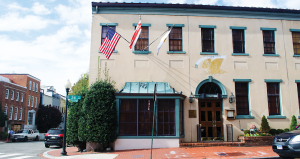Over 350 restaurants in the Washington, D.C. metropolitan area participated in the Restaurant Association Metropolitan Washington (RAMW)’s Restaurant Week between Jan. 27 and Feb. 2.
Georgetown University students dined out at participating restaurants across the D.C.-Maryland-Virginia area offering discounted brunch, lunch and dinner menus, including tasting options and all-you-can-eat dining. In the Georgetown neighborhood, locations offering Restaurant Week menus included 1789, Brasserie Liberte, Il Canale and Cafe Milano, among others.

Nazgol Missaghi (CAS ’28) said Restaurant Week allowed students to capitalize on the opportunity to experience fine dining that is normally cost prohibitive.
“Restaurant week is an awesome opportunity to get out into the District with your friends and try some new foods that you otherwise wouldn’t be able to — and at a discounted price,” Missaghi told The Hoya.
Luke Keller (CAS ’28) dined at Ambar, a Balkan restaurant in Arlington, Va. and said he was hesitant to consider himself a “foodie” because of the term’s financial implications.
“Being a ‘foodie’ has to do with lifestyle and like, ‘Are you willing to spend the money?’” Keller told The Hoya. “The appreciation is kind of balanced by a little bit of a distaste for what’s common. On one hand, I love great food, I love to cook, I really enjoy going out to restaurants. On the other hand, when I’m not doing that, I eat the same slop everyday — food that other people probably wouldn’t tolerate.”
Jack Willard (CAS ’28), who dined at Agora, a Mediterranean restaurant in Dupont Circle, said he was impressed by the variety of options on Agora’s tasting menu.
“They had a lot of good variety, which was nice, especially because I have a nut allergy and Mediterranean food tends to have a lot of nuts, but they had enough things that it didn’t feel like I was restricted in what I could eat,” Willard said.
Willard added that the fixed-price menus allowed him to explore options he may not have considered outside of Restaurant Week.
“It’s a lot more expensive than I would be used to trying,” Willard said. “It’s nice to be able to go out and try something I wouldn’t have been able to otherwise.”
Keller said he suspects the marketing of Restaurant Week likely succeeded in reaching the “foodie” demographic but added that future efforts could consider other groups who may be interested.
“For people who are in the circle of eating out I think the message gets across,” Keller said. “They should evaluate how to penetrate into an audience or demographic that doesn’t frequent restaurants as often to help get them in the doors.”
Willard said that, despite publicity efforts from both RAMW and participating restaurants, he only learned about Restaurant Week through word of mouth as it wrapped up.
“I didn’t really find out about it until it was ending,” Willard said. “We actually went on the last official night of Restaurant Week.”
Keller said next Restaurant Week, he plans to analyze the participating restaurants more carefully to take advantage of deals offered.
“I will look at which one would make the most sense to go during Restaurant Week, that being the restaurant where things actually change for it being Restaurant Week,” Keller said.
Willard said he intends to have a strategy to make the most out of the deals available during future Restaurant Weeks.
“I think next time we’ll have more of the game plan of different places to try and maybe explore different areas of D.C., too,” Willard said.
Missaghi said that although she tends to stay loyal to her favorite restaurants, she plans to make full use of Restaurant Week in the future.
“Now that I know about Restaurant Week, I will definitely be going back and trying different places, especially if my family is in town so I can take them as well,” Missaghi said.